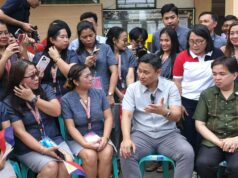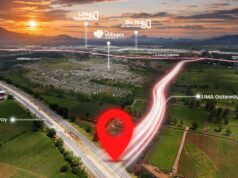CITY OF SAN FERNANDO—Balanga Bishop Socrates Villegas said Pope Benedict XVI did not endorse nuclear energy as an electricity source contrary to the claims by Pangasinan Rep. Mark Cojuangco who has been campaigning for the immediate re-commissioning of the mothballed Bataan Nuclear Power Plant.
A speech on nuclear power during the 50th general conference of the International Atomic Energy Agency (IAEA) in Vienna, Austria on Sept. 18, 2006 was delivered by Monsignor Pietro Parolin, not by Pope Benedict, Villegas said in an email to this reporter.
“In the same speech, the Vatican commended nuclear science but clarified that it is for the promotion of health and medicine. The same document warned about a repeat of Chernobyl [nuclear disaster]. The congressman does not quote that. He should present the whole text. Not the Pope but a monsignor gave this statement,” the bishop clarified.
The commendation, Villegas noted, was for nuclear medicine, not for nuclear power for electricity.
He said the BNPP, which has been mothballed due to 4,000 structural defects, is a “potential Chernobyl.”
Villegas said Pope John Paul II had said that Chernobyl has “become the symbol of the risks connected with the use of nuclear energy.”
The late Pope also urged to “prepare a future of peace, free of fear and similar threats. This is a task for everyone. For this to happen, there must be a combined technical, scientific and human effort to put every kind of energy at the service of peace, with respect for the needs of the human person and of nature.”
Cojuangco said the information he cited on CLTV 36’s Hamon Central Luzon last Tuesday came from a news report of Reuters.
“Why should he argue with me? I presented the data as reported in the news. I did not edit any text,” Cojuangco said in a phone interview.
He filed his bill on the revival of the BNPP in July last year to, he said, address energy shortage and curb the effects of global warming and climate change.
Insofar as he was concerned, he said there was “no ambiguity” in the Holy Father’s address on the 50th anniversary of the IAEA.
That speech, delivered on July 27, 2007 at Castel Gandolfo, is featured in the website of the IAEA.
Reflecting on peace, Pope Benedict XVI said: “Precisely today, in fact, is the 50th anniversary of the establishment of the Charter of the IAEA…instituted with the mandate “to accelerate and enlarge the contribution of atomic energy to peace, health and prosperity throughout the world. The Holy See, fully approving the goals of this Organization, is a member of it since its founding and continues to support its activity.”
This part, said Cojuangco, showed that the Pope “clearly supported the goals of the IAEA to promote nuclear energy.”
The Pope further stated that the “epochal changes that have occurred in the last 50 years demonstrate how, in the difficult crossroads in which humanity finds itself, the commitment to encourage non-proliferation of nuclear arms, to promote a progressive and agreed upon nuclear disarmament and to support the use of peaceful and safe nuclear technology for authentic development, respecting the environment and ever mindful of the most disadvantaged populations, is always more present and urgent.”
Cojuangco’s take on this is that “ang Pope galit na galit sa nangyayari sa global warming at nakikita niya ang nuclear energy to meet power requirements (The Pope is very angry about the results of global warming and he sees that nuclear energy can meet power requirements).”
Villegas said the Pope has stressed “peaceful and safe nuclear technology” which the “BNPP is not.”
In that same speech, the bishop said the Pope put a prayer for the intercession of the Virgin Mary that “scientific knowledge and technology are always applied with a sense of responsibility and for the common good, in full respect for international rights.”
Cojuangco also referred to a Reuters news on August 1, 2007 quoting the Pope’s justice minister, Cardinal Renato Martino to be saying on Vatican radio that “with maximum safety requirements in place for people and the environment, and with a ban in place on the hostile use of nuclear technology, why should the peaceful use of nuclear technology be barred?”
Villegas said Martino referred to safety, which he insisted was absent in the BNPP. A facility found unsafe by the Puno Commission and several investigative bodies in 1985-1986 could not be declared safe by Cojuangco’s bill, he said.
A speech on nuclear power during the 50th general conference of the International Atomic Energy Agency (IAEA) in Vienna, Austria on Sept. 18, 2006 was delivered by Monsignor Pietro Parolin, not by Pope Benedict, Villegas said in an email to this reporter.
“In the same speech, the Vatican commended nuclear science but clarified that it is for the promotion of health and medicine. The same document warned about a repeat of Chernobyl [nuclear disaster]. The congressman does not quote that. He should present the whole text. Not the Pope but a monsignor gave this statement,” the bishop clarified.
The commendation, Villegas noted, was for nuclear medicine, not for nuclear power for electricity.
He said the BNPP, which has been mothballed due to 4,000 structural defects, is a “potential Chernobyl.”
Villegas said Pope John Paul II had said that Chernobyl has “become the symbol of the risks connected with the use of nuclear energy.”
The late Pope also urged to “prepare a future of peace, free of fear and similar threats. This is a task for everyone. For this to happen, there must be a combined technical, scientific and human effort to put every kind of energy at the service of peace, with respect for the needs of the human person and of nature.”
Cojuangco said the information he cited on CLTV 36’s Hamon Central Luzon last Tuesday came from a news report of Reuters.
“Why should he argue with me? I presented the data as reported in the news. I did not edit any text,” Cojuangco said in a phone interview.
He filed his bill on the revival of the BNPP in July last year to, he said, address energy shortage and curb the effects of global warming and climate change.
Insofar as he was concerned, he said there was “no ambiguity” in the Holy Father’s address on the 50th anniversary of the IAEA.
That speech, delivered on July 27, 2007 at Castel Gandolfo, is featured in the website of the IAEA.
Reflecting on peace, Pope Benedict XVI said: “Precisely today, in fact, is the 50th anniversary of the establishment of the Charter of the IAEA…instituted with the mandate “to accelerate and enlarge the contribution of atomic energy to peace, health and prosperity throughout the world. The Holy See, fully approving the goals of this Organization, is a member of it since its founding and continues to support its activity.”
This part, said Cojuangco, showed that the Pope “clearly supported the goals of the IAEA to promote nuclear energy.”
The Pope further stated that the “epochal changes that have occurred in the last 50 years demonstrate how, in the difficult crossroads in which humanity finds itself, the commitment to encourage non-proliferation of nuclear arms, to promote a progressive and agreed upon nuclear disarmament and to support the use of peaceful and safe nuclear technology for authentic development, respecting the environment and ever mindful of the most disadvantaged populations, is always more present and urgent.”
Cojuangco’s take on this is that “ang Pope galit na galit sa nangyayari sa global warming at nakikita niya ang nuclear energy to meet power requirements (The Pope is very angry about the results of global warming and he sees that nuclear energy can meet power requirements).”
Villegas said the Pope has stressed “peaceful and safe nuclear technology” which the “BNPP is not.”
In that same speech, the bishop said the Pope put a prayer for the intercession of the Virgin Mary that “scientific knowledge and technology are always applied with a sense of responsibility and for the common good, in full respect for international rights.”
Cojuangco also referred to a Reuters news on August 1, 2007 quoting the Pope’s justice minister, Cardinal Renato Martino to be saying on Vatican radio that “with maximum safety requirements in place for people and the environment, and with a ban in place on the hostile use of nuclear technology, why should the peaceful use of nuclear technology be barred?”
Villegas said Martino referred to safety, which he insisted was absent in the BNPP. A facility found unsafe by the Puno Commission and several investigative bodies in 1985-1986 could not be declared safe by Cojuangco’s bill, he said.




